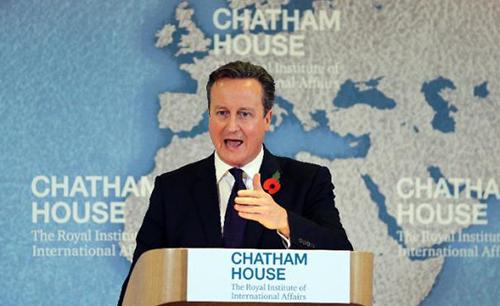Cameron lays out demands for Britain to stay in EU
Prime Minister David Cameron warned Tuesday that Britain could leave the EU if it does not get the reforms it wants, as he laid out demands that European leaders said would be "difficult" to meet in full.
But Cameron said he was confident he could clinch an agreement to avert "Brexit" in a "once-in-a-generation" referendum due to be held by 2017.
Cameron's address came as he sent a long-awaited letter addressed to EU president Donald Tusk, laying out Britain's shopping list for change.
While the letter contained little new detail, it helped crystallise that the main fight Cameron faces is over his plan to slash immigration by restricting state benefits to migrants from elsewhere in the EU for their first four years in Britain.
Responding to the speech, a European Commission spokesman called this idea "highly problematic".
German Chancellor Angela Merkel thought there were "some difficult (demands), others that are less difficult" while stressing she was "reasonably confident" of a deal.
"The referendum... will be a once-in-a-generation choice," Cameron told an audience in London. "This is a huge decision for our country -- perhaps the biggest we'll make in our lifetime."
He said he had "every confidence" of securing an agreement but added that he would not rule out campaigning to leave the 28-member bloc.
"If we can't reach an agreement and if Britain's concerns were to be met with a deaf ear, which I do not believe will happen, then we will have to think again about whether this European Union is right for us," he said. "I rule nothing out."
However, he did not repeat his threat that Britain could leave the EU in his letter to Tusk.
Soon after his speech, there were indications that the government could be preparing to compromise on the demand for a four-year benefits residency qualification.
Europe Minister David Lidington acknowledged "concerns" among other EU countries on the issue, adding it was the "outcome" that was important, while the letter used similar language.
"My sense is that the line is softening," John Springford, senior research fellow at the Centre for European Reform, told AFP. "The letter, and David Lidington’s remarks, suggest that Britain will seek a compromise."
The other three, less disputed, areas where Cameron wants reform are on improving competitiveness, greater "fairness" between eurozone and non-eurozone nations, and sovereignty issues including an exemption from the EU goal of ever-closer union.
Caption: British Prime Minister David Cameron delivers a speech at the Chatham House thinktank in central London
Photo: Yahoo!
Related Posts

